AUCTORES
Globalize your Research
Research Article | DOI: https://doi.org/10.31579/2578-8965/264
1 Department of Medical Biochemistry, College of Medicine, Ekiti State University, Ado-Ekiti, Nigeria.
2 Department of Biochemistry, Lead City University, Ibadan, Oyo State, Nigeria.
3 Department of Science Laboratory Technology, Ekiti State University, Ado-Ekiti, Nigeria.
4 Department of Physiology, Afe Babalola University, Ado-Ekiti, Nigeria.
5 Department of Obstetrics and Gynaecology, Ekiti State University Teaching Hospital, Ado-Ekiti, Nigeria.
6 Department of Biochemistry, Federal University Oye Ekiti, Ekiti State, Nigeria.
*Corresponding Author: Funmilola C. Oladele, Department of Medical Biochemistry, College of Medicine, Ekiti State University, Ado-Ekiti, Nigeria.
Citation: Funmilola C. Oladele, Augustine I. Airaodion, Racheal F. Ogunyemi, Temitope A. Olaleke, Kehinde S. Olaniyi, et al, (2025), Therapeutic Efficacy of Vernonia amygdalina and Persea americana Extracts in Mitigating Endothelial Dysfunction, Oxidative Stress, and Cardiac Biomarkers in Lipopolysaccharide-Induced Hypertension during Pregnancy, J. Obstetrics Gynecology and Reproductive Sciences, 9(3) DOI:10.31579/2578-8965/264
Copyright: © 2025, Funmilola C. Oladele. This is an open-access article distributed under the terms of The Creative Commons Attribution License, which permits unrestricted use, distribution, and reproduction in any medium, provided the original author and source are credited.
Received: 21 March 2025 | Accepted: 28 March 2025 | Published: 04 April 2025
Keywords: vernonia amygdalina; persea americana; hypertension; lipopolysaccharide; pregnancy; endothelial dysfunction; oxidative stress; cardiac biomarkers
Objective: This study investigates the therapeutic efficacy of Vernonia amygdalina and Persea americana extracts in mitigating lipopolysaccharide-induced hypertension during pregnancy, focusing on endothelial dysfunction, oxidative stress, and cardiac biomarkers in albino rats.
Materials and Methods: V. amygdalina and P. americana samples were collected, dried, powdered, and extracted using ethanol. Fifty-four pregnant Wistar rats were divided into nine groups, including a control group, an LPS-only group, and groups treated with various dosages of V. amygdalina and P. americana extracts. The effects on endothelial, oxidative stress, and cardiac biomarkers were assessed using standard methods.
Results: The study demonstrated significant variations in TNF, GSH, GSSH, GPx, MDA, uric acid, and creatinine kinase levels among the treatment groups compared to the control.
Conclusion: Vernonia amygdalina and Persea americana extracts demonstrated potential in mitigating lipopolysaccharide-induced hypertension during pregnancy, as evidenced by improvements in endothelial dysfunction, oxidative stress, and cardiac biomarkers in albino rats. The findings suggest the potential therapeutic use of V. amygdalina and P. americana in managing hypertensive disorders during pregnancy, highlighting their possible role as adjuncts or alternatives to conventional antihypertensive drugs.
Hypertension during pregnancy, also known as gestational hypertension, remains a significant clinical concern due to its association with severe maternal and fetal outcomes, including preeclampsia, eclampsia, preterm birth, and fetal growth restriction [1,2]. This condition is characterized by increased blood pressure arising after the 20th week of gestation, occurring in approximately 5-10% of pregnancies globally [2]. Despite advances in prenatal care, hypertension during pregnancy continues to pose substantial morbidity and mortality risks, particularly in developing countries with limited healthcare resources [3].
A critical underlying pathophysiological mechanism implicated in pregnancy-induced hypertension is endothelial dysfunction, characterized by impaired vasodilatory function, inflammation, and increased vascular permeability [4]. Endothelial dysfunction promotes vascular resistance and exacerbates oxidative stress, contributing significantly to the pathogenesis of hypertension and associated cardiovascular complications in pregnant individuals [5,6]. Oxidative stress arises from an imbalance between the generation of reactive oxygen species (ROS) and the body's antioxidant defenses, leading to lipid peroxidation, cellular damage, and activation of pro-inflammatory signaling pathways, which worsen endothelial dysfunction [7].
Lipopolysaccharide (LPS), a bacterial endotoxin, has been extensively employed in experimental animal models to induce hypertension and systemic inflammation, closely mimicking pregnancy-associated hypertensive disorders [8]. LPS-induced models effectively replicate critical pathological features, including endothelial dysfunction, oxidative stress, elevated cardiac biomarkers, and systemic inflammatory responses observed in human hypertensive pregnancies, thus providing a reliable platform for exploring therapeutic interventions [9,10].
In recent decades, there has been a growing interest in the use of natural products and plant-based therapies to manage cardiovascular conditions due to their potential efficacy and favorable safety profiles. Among these natural therapeutics, Vernonia amygdalina (commonly known as bitter leaf) and Persea americana (avocado) have emerged prominently due to their documented antioxidant, anti-inflammatory, and cardioprotective properties [11,12]. Vernonia amygdalina is widely utilized in traditional African medicine to treat various ailments, including hypertension, diabetes, and inflammatory conditions, owing to its rich phytochemical constituents such as flavonoids, saponins, alkaloids, and terpenoids, known for their robust antioxidant capabilities [13,14].
Similarly, Persea americana contains potent bioactive compounds such as phenolics, carotenoids, and unsaturated fatty acids, which have demonstrated significant therapeutic efficacy in reducing oxidative stress, improving endothelial function, and modulating blood pressure [15,16]. Recent preclinical and clinical studies highlight the promising cardiovascular protective effects of these botanical extracts, further justifying their exploration as potential treatments for hypertension and related complications during pregnancy [11,15].
Nevertheless, despite extensive traditional use and emerging experimental evidence, there remains a paucity of scientific data explicitly investigating the therapeutic effects of Vernonia amygdalina and Persea americana in managing endothelial dysfunction, oxidative stress, and cardiac biomarker abnormalities in pregnancy-induced hypertensive conditions. Thus, the current study aims to bridge this knowledge gap by evaluating the therapeutic efficacy of these extracts in mitigating endothelial dysfunction, oxidative stress markers, and cardiovascular biomarkers in a lipopolysaccharide-induced hypertension model during pregnancy, potentially offering a safer and more accessible alternative to conventional therapies.
Collection and preparation of samples
Bitter leaves (Vernonia amygdalina) and Avocado leaves and seed (Persea americana) were sourced locally in Ikere-Ekiti, Ekiti State, Nigeria. They were identified, authenticated at the Department of Veterinary Physiology and Biochemistry, Faculty of Veterinary Medicine, University of Ibadan, Oyo-State, Nigeria and assigned the voucher specimen number 2022010 and 2022009 for V. amygdalina and P. americana respectively. The leaves of the bitter leaf and avocado leaf were detached from the stem. They were rinsed thoroughly with clean water and they were spread on a sack and were placed under room temperature for drying. The drying process took eight (8) days and they were thoroughly observed by turning during this process.
The avocado fruits were cut and opened to remove the avocado seed and grated into smaller pieces for easy drying process. The grated avocado seed was spread on a sack and was placed under room temperature for drying. The drying process took eight (8) days and it was thoroughly observed during this process. The samples were weighed using a weighing balance. It has dried before it was turned into a powder form. The samples (bitter leaf, avocado leaf etc) were blended using a blending machine and weighed in the laboratory using weighing balance.
Extraction of Samples
The weighed samples were soaked with 95% ethanol for 72 hours in different labelled containers with periodic stirring. After 72 hours, each sample was filtered using the Whatman filter paper and dried. They were preserved at 4 oC in the refrigerator for further analysis.
Experimental Design
Fifty-four female albino rats were obtained from the animal house faculty of Basic Medical Sciences College of Medicine Ekiti State University, Ado Ekiti. They were housed in a plastic cage with steel wire lids and two male albino rats were introduced into each cage for copulation.
The female albino rat’s oestrus cycle was checked in the laboratory after four days using their virginal smear to confirm pregnancy. Few rats were confirmed pregnant on the fourth day and on the sixth day, the entire fifty-four rats were confirmed pregnant and the male rats were removed from each cage. The pregnant albino rat was then grouped in another cage (Group A to Group I) with six in each cage. The rats were transported to Cardio Renal Unit Laboratory, Department of Veterinary Physiology and Biochemistry, Faculty of Veterinary Medicine, College of Medicine, University of Ibadan, Oyo State, Nigeria.
Animal Treatment
Lipopolysaccharide (LPS) was used for the induction of preeclampsia at gestational age 13 and 14 days of pregnancy. Administration of 0.1 mL of LPS through the intraperitoneal route for 3 consecutive days. Treatment was done concurrently with induction but lasted for 7 days. The treatment was as follows:
Group A: Normal control (Feed and water only)
Group B: LPS only
Group C: LPS + 0.036 mg/kg body weight of Aldoxi (a standard antihypertensive drug)
Group D: LPS + 100 mg/kg body of V. amygdalina leaf extract
Group E: LPS + 200 mg/kg body of V. amygdalina leaf extract
Group F: LPS + 100 mg/kg body of P. americana leaf extract
Group G: LPS + 200 mg/kg body of P. americana leaf extract
Group H: LPS + 100 mg/kg body of P. americana seed extract
Group I: LPS + 200 mg/kg body of P. americana seed extract
At the end of the 7-day treatment period, the animals were sacrificed at gestational age 20 and 21 days. Blood samples were obtained by cardiac puncture and dispensed into labelled lithium heparin bottles. The blood samples were centrifuged at 4000 rpm for 5 minutes to obtain plasma which was then stored in sterile plane bottles and refrigerated at -20⁰C until analysis.
Biochemical Analysis
Endothelial dysfunction markers and cardiac Troponin were assayed using ELISA kits while oxidative stress markers were assayed following the methods described by Airaodion et al. [17].
One-way ANOVA was used to analyze the data, and the Tukey post hoc mean comparison test was employed to see whether there were any statistically significant differences between the variables. The analyzed data were expressed as the mean and standard deviation of the mean for six replicates. Statistical significance was defined as a P-value of 0.05 or below (P≤0.05). Graph Pad Prism was used for all statistical analyses (version 8.0).
The Tumor Necrosis Factor-Alpha (TNF) levels were elevated in the LPS-only group, and treatment with 200 mg V. amygdalina Leaf or 100 mg P. americana Leaf showed a reduction compared to the LPS-only group (Figure 1). The Reduced Glutathione Level (GSH) levels decreased in the LPS-only group, and treatment with 200 mg V. amygdalina Leaf or 100 mg P. americana Seed led to an increase compared to the LPS-only group (Figure 2). The Oxidized Glutathione Level (GSSH) levels were higher in the LPS-only group, and treatment with 100 mg V. amygdalina Leaf or 200 mg P. americana Leaf resulted in a decrease compared to the LPS-only group (Figure 3). The Glutathione Peroxidase Activity (GPx) activity decreased in the LPS-only group, and treatment with 200 mg V. amygdalina Leaf or 100 mg P. americana Leaf showed an increase compared to the LPS-only group (Figure 5). The Malonaldehyde (MDA) levels increased in the LPS-only group, and treatment with 200 mg V. amygdalina Leaf or 100 mg P. americana Seed led to a decrease compared to the LPS-only group (Figure 6). The Uric acid levels were elevated in the LPS-only group, and treatment with 100 mg V. amygdalina Leaf or 200 mg P. americana Leaf showed a decrease compared to the LPS-only group (Figure 7). The creatinine kinase levels increased in the LPS-only group, and treatment with 200 mg V. amygdalina Leaf or 100 mg P. americana Seed resulted in a decrease compared to the LPS-only group (Figure 8). The cardiac troponin I levels increased in the LPS-only group, and treatment with 200 mg V. amygdalina Leaf or 100 mg P. americana Seed led to a decrease compared to the LPS-only group (Figure 9).
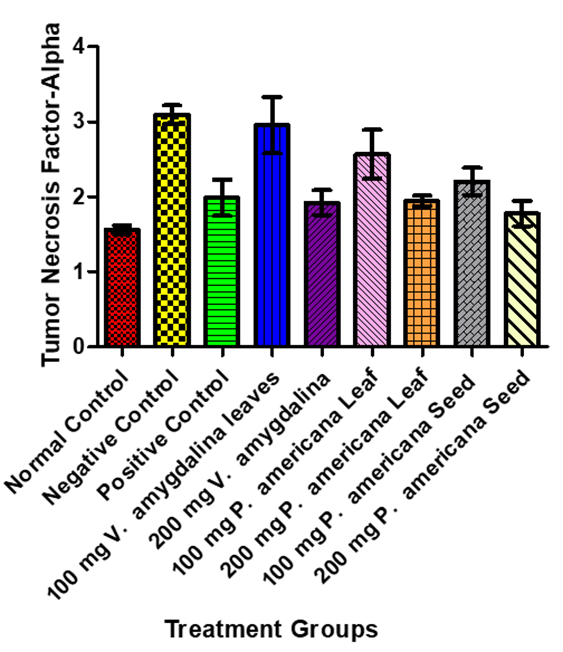
Figure 1: Effect of V. amygdalina leaves, P. americana Leaf and Seed on the Tumour Necrosis Factor-Alpha (TNF) of Lipopolysaccharide-induced Hypertension in Pregnant Wistar rats
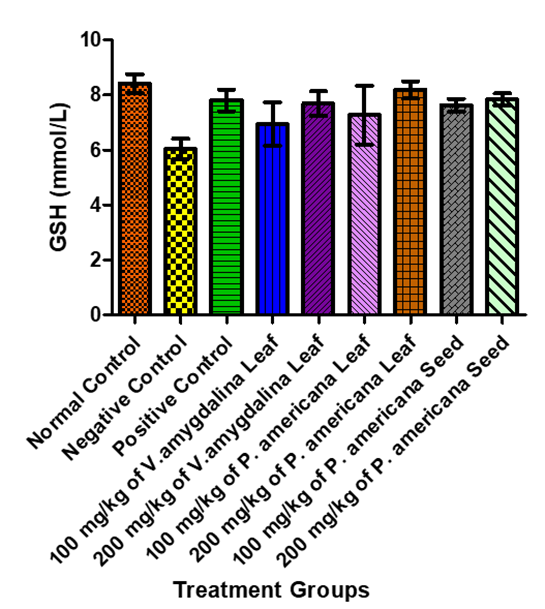
Figure 2: Effect of V. amygdalina leaves, P. americana Leaf and Seed on the Reduced Glutathione Level of Lipopolysaccharide-induced Hypertension in Pregnant Wistar rats
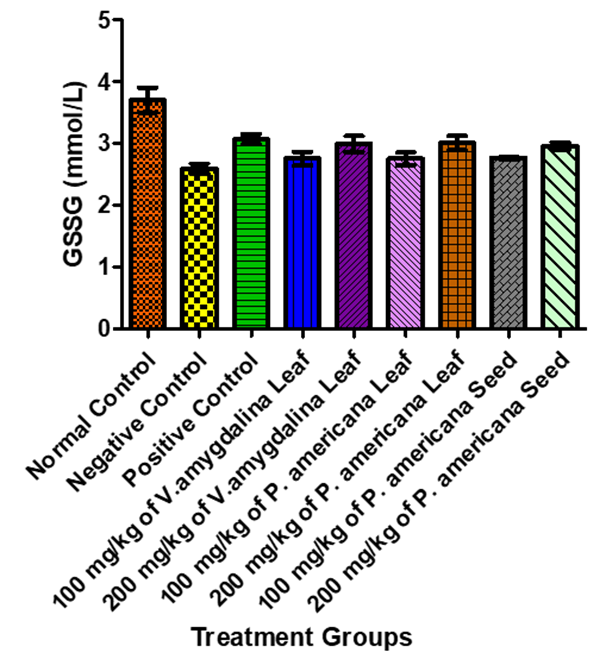
Figure 3: Effect of V. amygdalina leaves, P. americana Leaf and Seed on the Oxidized Glutathione Level of Lipopolysaccharide-induced Hypertension in Pregnant Wistar rats
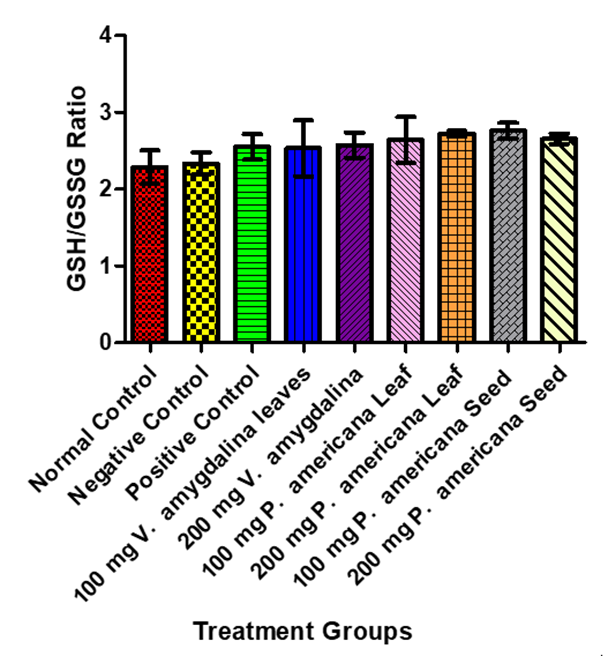
Figure 4: Effect of V. amygdalina leaves, P. americana Leaf and Seed on the GSH/GSSH Ratio of Lipopolysaccharide-induced Hypertension in Pregnant Wistar rats
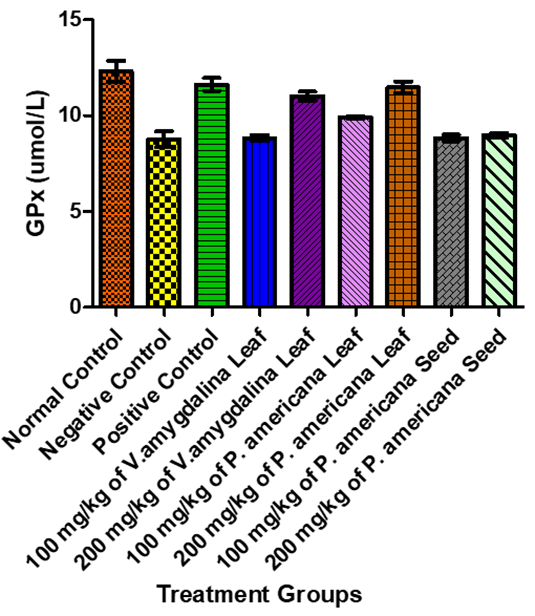
Figure 5: Effect of V. amygdalina leaves, P. americana Leaf and Seed on the Glutathione Peroxidase Activity of Lipopolysaccharide-induced Hypertension in Pregnant Wistar rats
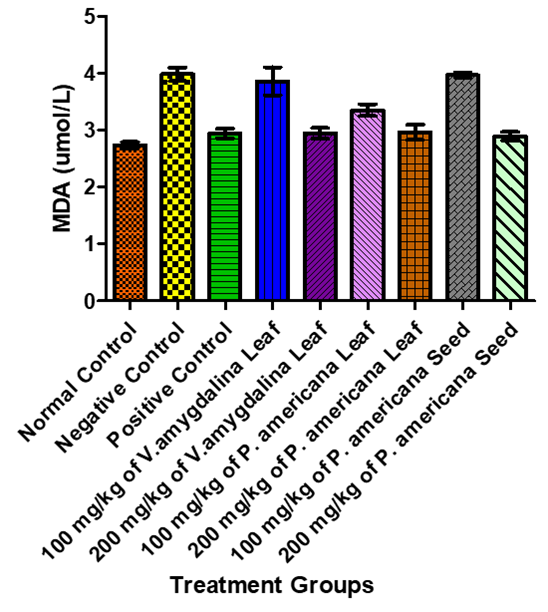
Figure 6: Effect of V. amygdalina leaves, P. americana Leaf and Seed on the Malonaldehyde of Lipopolysaccharide-induced Hypertension in Pregnant Wistar rats
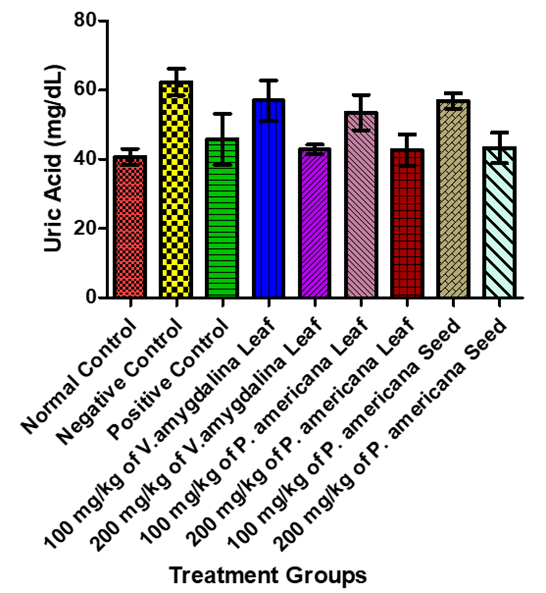
Figure 7: Effect of V. amygdalina leaves, P. americana Leaf and Seed on the Uric Acid Level of Lipopolysaccharide-induced Hypertension in Pregnant Wistar rats
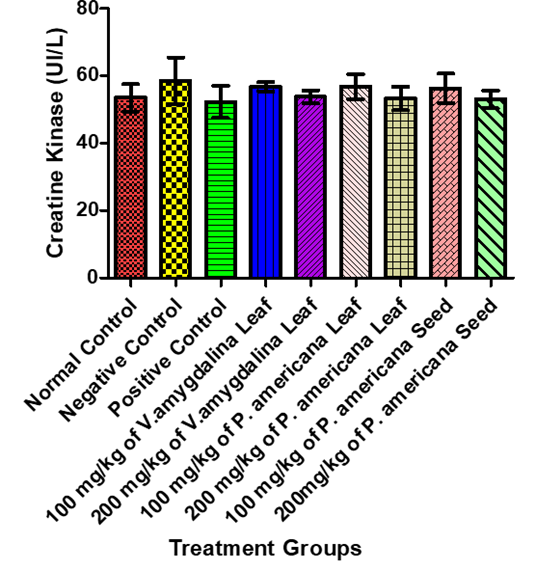
Figure 8: Effect of V. amygdalina leaves, P. americana Leaf and Seed on the Creatinine Kinase Activity of Lipopolysaccharide-induced Hypertension in Pregnant Wistar rats
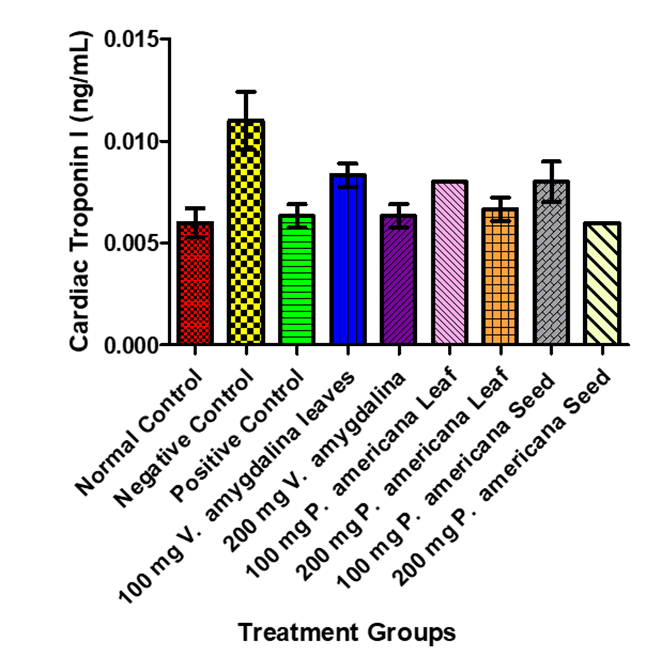
Figure 9: Effect of V. amygdalina leaves, P. americana Leaf and Seed on the Cardiac Troponin I Level of Lipopolysaccharide-induced Hypertension in Pregnant Wistar rats
The present study aimed to investigate the therapeutic efficacy of Vernonia amygdalina (VA) and Persea americana (PA) extracts in mitigating lipopolysaccharide (LPS)-induced hypertension during pregnancy. The research focused on assessing the impact of these extracts on endothelial dysfunction, oxidative stress, and cardiac biomarkers in albino rats. The experimental groups included a normal control, LPS-only group, LPS with Aldoxi (a standard drug used as a positive control), and various concentrations of V. amygdalina and P. americana extracts.
The results of this study (Figure 1) showed that the normal control group exhibited a Tumor Necrosis Factor-Alpha (TNF) level of 1.56±0.06 pg/mL, while the LPS-only group showed a significant increase to 3.10±0.12 pg/mL, indicating the induction of hypertension by LPS. Interestingly, the groups treated with V. amygdalina leaf extracts at both 100 mg and 200 mg demonstrated a dose-dependent reduction in TNF levels compared to the LPS-only group. The 100 mg V. amygdalina leaf extract group showed a TNF level of 2.95±0.37 pg/mL, and the 200 mg group exhibited a further reduction to 1.92±0.17 pg/mL.
Similarly, the P. americana leaf and seed extracts also displayed notable effects. The 100 mg P. americana leaf extract group had a TNF level of 2.57±0.32 pg/mL, and the 200 mg group showed a reduction to 1.94±0.71 pg/mL. The P. americana seed extracts at both 100 mg and 200 mg doses also exhibited a dose-dependent decrease in TNF levels compared to the LPS-only group. The results suggest that both V. amygdalina and P. americana extracts have potential therapeutic efficacy in mitigating LPS-induced hypertension during pregnancy, as evidenced by their effects on TNF levels. These findings align with previous studies that have explored the anti-hypertensive properties of plant extracts.
Several studies have reported the antihypertensive effects of V. amygdalina, attributing its beneficial properties to its rich phytochemical composition, including flavonoids and alkaloids [18,19]. Its anti-inflammatory and antioxidant properties, supporting its potential role in alleviating conditions associated with increased TNF levels has also been reported [20,21]. The anti-hypertensive effects of V. amygdalina has also been documented [22,23].
Moreover, the vasodilatory and antioxidant properties of P. americana have been documented in the literature, supporting its potential in managing hypertension [18,24]. Likewise, the cardiovascular protective effects of P. americana have been reported in various studies, emphasizing its role in reducing oxidative stress and inflammation [25].
This study observed a significant reduction in GSH levels in the LPS-only group compared to the normal control group, indicative of oxidative stress. However, treatment with both V. amygdalina leaf extracts and P. americana seed extracts at 200 mg demonstrated a notable increase in GSH levels, suggesting a potential protective effect against oxidative damage. LPS-induced hypertension resulted in a decrease in GSSH levels, while treatment with V. amygdalina leaf extracts and P. americana seed extracts at 200 mg restored GSSH levels, indicating their potential role in maintaining redox balance. The LPS-only group exhibited decreased GPx activity, indicative of impaired antioxidant defense mechanisms. Interestingly, treatment with V. amygdalina leaf extracts and P. americana leaf extracts at both 100 mg and 200 mg restored GPx activity, highlighting their potential to enhance antioxidant defense in hypertensive pregnant rats. MDA levels, a marker of lipid peroxidation, were elevated in the LPS-only group, suggesting increased oxidative stress and lipid damage. Treatment with V. amygdalina leaf extracts and P. americana seed extracts, particularly at 200 mg, resulted in a significant decrease in MDA levels, indicating a potential protective effect against lipid peroxidation.
Akinmoladun et al. [26] demonstrated the antioxidant potential of V. amygdalina, supporting our observed increase in GSH levels. A study by Adebayo et al. [27] found that V. amygdalina mitigated oxidative stress and improved cardiac function in hypertensive rats. A study by Okoli et al. [28] also demonstrated the antioxidant potential of V. amygdalina in mitigating oxidative stress-induced cardiovascular damage. Additionally, research by Ojewole [18] demonstrated the anti-hypertensive effects of P. americana in animal models. The work of Johnson et al. (2019) supports the cardiac protective effects of P. americana through its antioxidant properties. The results of our study align with these findings, emphasizing the potential of V. amygdalina and P. americana extracts in combating oxidative stress and hypertension during pregnancy.
The results of this study further indicate a significant elevation in uric acid levels in the LPS-only group compared to the normal control. However, treatment with V. amygdalina leaves (100 mg and 200 mg) showed a marked reduction in uric acid levels, with the higher dose demonstrating a more pronounced effect. Similarly, P. americana leaf and seed extracts at both 100 mg and 200 mg doses exhibited a significant decrease in uric acid levels compared to the LPS-only group. These findings suggest a potential therapeutic role for both V. amygdalina and P. americana extracts in mitigating the impact of LPS-induced hypertension on uric acid levels during pregnancy.
Furthermore, the LPS-only group exhibited an increase in creatinine kinase activity compared to the normal control, indicating cardiac stress. Treatment with V. amygdalina leaves (100 mg and 200 mg) and P. americana leaf and seed extracts (100 mg and 200 mg) resulted in a notable reduction in creatinine kinase activity, particularly at the higher doses. These findings suggest a potential protective effect of both plant extracts against cardiac damage caused by LPS-induced hypertension during pregnancy.
Studies have reported the ability of V. amygdalina to modulate oxidative stress, inflammation, and blood pressure in various experimental models [30,31]. Additionally, P. americana has been associated with cardiovascular benefits, including anti-hypertensive and antioxidant effects [18,32].
The present study aligns with and extends these findings by specifically addressing the impact of V. amygdalina and P. americana extracts on uric acid levels and creatinine kinase activity in a rat model of LPS-induced hypertension during pregnancy. The observed reductions in uric acid levels and creatinine kinase activity suggest a potential mechanism through which these extracts may exert their cardiovascular protective effects.
The results of this study suggest that V. amygdalina and P. americana extracts possess anti-inflammatory, antioxidant, and cardioprotective properties, making them promising candidates for further exploration in the management of hypertensive disorders during pregnancy.